When it comes to eggs, most people know that chickens are the primary source. But did you know that a common myth suggests that hens need roosters to lay eggs? Many people believe that a rooster is essential for egg production. But is this true? How can a hen lay an egg without a rooster? This piece will explore the honest answer to this question and see what it reveals.
Chicken farming background
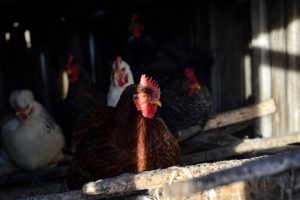

First of all, let’s start with a little bit of background information. A hen is a name given to a female chicken, whereas a rooster is given to a male chicken. Hens are known for laying eggs, which can be used for various purposes, from eating to hatching chicks.
On the other hand, roosters are primarily known for their role in fertilizing eggs, leading to the development of chicks.
Can a Hen Lay an Egg Without a Rooster?
So, can a hen lay an egg without a rooster? The short answer is yes; hens can lay eggs without a rooster. That is because the egg-laying process is controlled by hormones, not by mating. Hens will lay eggs regardless of whether there is a rooster. However, the eggs hens lay without mating will be infertile, meaning they will not develop into chicks.
How Do Hens Lay Eggs?


To figure out how hens lay eggs, we must examine their reproductive system in more detail. A few components comprise a hen’s reproductive system: the ovary, oviduct, and cloaca. Each hen has two ovaries, one on each side of the body, where eggs are produced. After fertilization, the egg makes its way via the oviduct on its way to the uterus. The egg finally emerges from the hen through the cloaca.
The egg-laying process begins when an egg is released from the hen’s ovary and travels down the oviduct. The egg develops a protective shell as it makes its way down the oviduct, made of layers of egg white. When the egg is ready, it is released from the cloaca.
How Often Do Hens Lay Eggs?
The frequency with which hens lay eggs depends on several factors, including breed, age, and environmental conditions. Generally, most hens will lay one egg daily, although this can vary. Some breeds are known for being prolific layers, while others lay eggs less frequently. As hens age, they may lay fewer eggs, and environmental factors such as temperature and lighting can also impact egg production.
Factors affecting laying eggs


Several factors can affect a hen’s egg-laying production. The following are some very typical cases:
- Age: Young hens are generally more productive egg layers than older hens. Hens typically start laying eggs at around five to six months of age, and their egg production will peak at around one to two years of age before gradually declining.
- Breed: Different breeds of chickens have varying levels of egg-laying productivity. Some breeds, such as Leghorns, are known for being prolific layers, while others, like Silkies, lay eggs less frequently.
- Nutrition: Hens require a balanced diet with suitable protein, vitamins, and minerals to produce eggs. A diet deficient in specific nutrients can cause a decline in egg production.
- Lighting: Hens require a certain amount of light to stimulate their reproductive systems and trigger egg production. A lack of light or irregular lighting schedules can decrease egg production.
- Stress: Hens that are stressed or anxious may lay fewer eggs or stop laying altogether. Familiar sources of stress for hens include overcrowding, loud noises, and the presence of predators.
- Health: Hens that are sick or injured may lay fewer eggs or stop laying altogether. Common health issues affecting egg production include infections, parasites, and vitamin deficiencies.
By addressing these factors and providing your hens with a healthy and comfortable living environment, you can maximize their egg-laying productivity and ensure a steady supply of fresh eggs.
How to maintain poultry farm for high egg yield
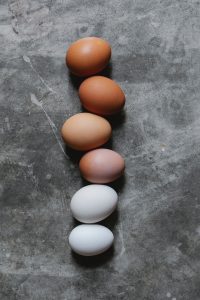

Maintaining a poultry farm to get more egg yield requires a combination of good management practices and attention to the needs of the birds. Here are some tips for maximizing egg production:
- Provide a clean and comfortable living environment: Stressed or uncomfortable Hens are less likely to lay eggs. Ensure that the coop is clean, well-ventilated, and free from drafts. Provide plenty of space for the birds to move around and perch.
- Feed a high-quality diet: Hens require a balanced diet containing suitable protein, vitamins, and minerals to produce eggs. Feed your hens a high-quality commercial or balanced diet that includes grains, vegetables, and protein sources.
- Ensure adequate lighting: Hens require a certain amount of light to stimulate their reproductive systems and trigger egg production. Provide at least 14-16 hours of light daily using artificial lighting if necessary.
- Provide access to clean water: Hens require plenty of clean water to stay hydrated and produce eggs. Ensure that the water is fresh and easily accessible at all times.
- Practice good biosecurity: Disease can spread quickly through a poultry flock, reducing egg production. Practice suitable biosecurity measures, such as limiting access to the flock, cleaning and disinfecting equipment and facilities, and monitoring the birds’ health.
- Monitor egg production: Keep track of the number of eggs produced each day and identify any changes in production. That can help you identify potential health or environmental issues affecting egg production.
Keeping your hens healthy and happy will increase your egg production and the value of your poultry farm.
Conclusion
In conclusion, hens can lay eggs without a rooster. The egg-laying process is controlled by hormones, not by mating, so hens will lay eggs regardless of whether a rooster exists. However, the eggs hens lay without mating will be infertile and not develop into chicks. Understanding how hens lay eggs is essential for anyone who raises chickens, whether for eggs or meat. By providing the right conditions and care, you can ensure that your hens are healthy and productive, providing you with a steady supply of delicious and nutritious eggs.
Read More:
How Many Acres of Land Do I Need for Country Chicken Poultry Farming?

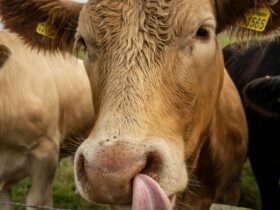
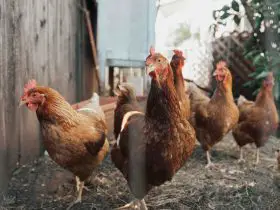

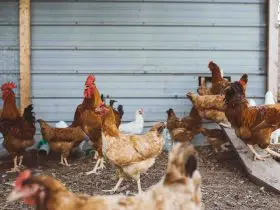


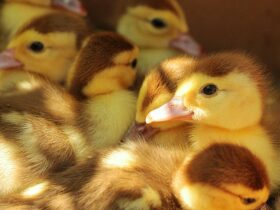
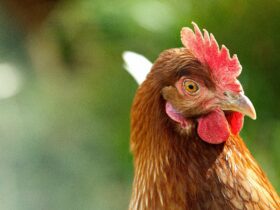

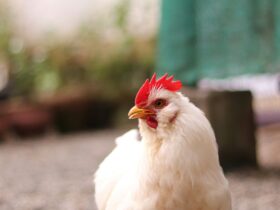

Hello!! Welcome to Anim Farm